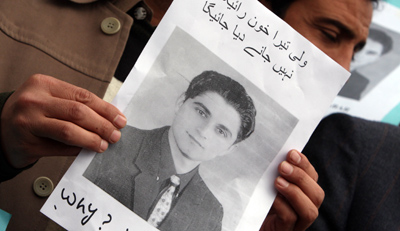On Monday, a well-known Pakistani journalist came to our office in New York. We had been messaging and texting for a few weeks, so I knew what to expect. Despite the harsh reality check that CPJ’s Sheryl Mendez and I offered during our 90-minute meeting, he is going ahead with the process of applying for asylum in the United States. “I would rather live as a poor man in a mud hut than as a king in a castle who feared for his life,” he told us. It sounded like a line he had prepared to convince us, and perhaps himself, that he was doing the right thing.
He won’t be living in a mud hut, but he and his wife and children are in a small apartment in the New York borough of Queens, where many other Pakistanis have settled as they try to climb the increasingly precarious American economic ladder. It’s a far cry from the comfortable, two-car compound life he was leading in Karachi.
I’ve been in these sorts of meetings many times, as has Mendez, who works in our Journalist Assistance program. We told him several times that he may find little satisfaction here in the United States, that his upward arcing career will likely collapse, and that the financial foundation that gave his family a good life in Pakistan will erode during an application process that could last a few years.
I was filled with emotion hearing him describe his wife’s legitimate concerns for his safety and that of his family’s. He detailed his talks with Pakistani colleagues, many of whom I know well, about the wisest path for him to take. He said many counseled him to leave the country. My advice–go back, change cities, keep a lower profile–rang hollow to him. “What should I do: Not report what I know just to stay safe?” he asked. What could I say? Ignore your wife? Live in fear? Corrupt your journalism? At the end of the 90 minutes I told him I would write about our meeting, but I promised I would not reveal his identity in case he did decide to go back.
This man feared for his life at the hands of the MQM, the Muttahida Qaumi Movement. The MQM is Pakistan’s third-largest political party, and is considered the country’s largest secular political party, with Karachi and the Sindh region its base. Locked in political turf wars in Karachi, party operatives have been threatening journalists for years. Much attention has been paid to the possible involvement of government intelligence agencies in the death of Saleem Shahzad in May and the roadside beating of Waqar Kiyani in June, but the MQM also figures to be a prime suspect in numerous attacks on the press this year.
According to the newsroom colleagues of Geo TV reporter Wali Khan Babar, MQM gunmen killed him in a drive-by shooting in January. And journalists have little doubt that Faisal Qureshi, who wrote for the stoutly anti-MQM London Post website, was killed in his home by an MQM hit squad on October 7.
When I visited Karachi in April and May this year, staffers at the small Metro TV station said the MQM was at the top of a short list of suspects in the attempted murder of Metro reporter Naveed Kamal in April. He survived a bullet through his jaw. Kamal told me he wasn’t sure who was behind the shooting, which came shortly after he aired a story about various groups flying flags over Karachi neighborhoods, staking out political turf.
It goes without saying, given the near perfect impunity with which journalists are killed in Pakistan, that very little of substance, beyond the showcase arrests of a few MQM underlings in Babar’s case, has occurred in the investigations into these attacks.
The journalist who came to our office says he is going ahead with the asylum application, although we gave him pause for thought. He left with the paperwork in his hands. It was a hard meeting, and I rode down with him in the elevator and out the front door of our building. Out on 7th Avenue we shared the firm handshake that goes with these sorts of fraught decisions. It was a turning point in his life.
This intelligent, successful reporter could find no other way to stay safe and alive other than to uproot his family, end his career, and flee the land of his birth. He sees no government agency in Pakistan that can protect him, no group of friends well connected enough to intervene on his behalf, no employer who can keep him safe and gainfully employed.
What will stop others with equally legitimate fears from doing the same?
